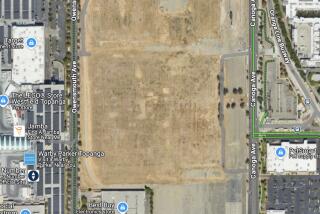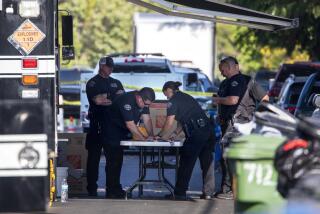Rocketdyne Official Denies Cover-Up Attempt
A retired Rocketdyne manager on Wednesday denied approving phony tests to cover up illegal waste burnings at the Santa Susana Field Laboratory near Chatsworth, where two scientists were killed in a 1994 explosion.
Joseph E. Flanagan, one of two former Rocketdyne employees on trial in Riverside, testified in his defense. He is charged with federal environmental crimes and could be sentenced to prison if convicted.
For three months, Flanagan, 61, has listened to the case against him. He told jurors Wednesday that he had waited seven years to testify.
Flanagan, the former director of Rocketdyne’s Chemical Technology Group, and Edgar R. Wilson, 65, a lab technician and former sheriff’s deputy, are charged with two felony counts of illegally burning chemical waste. Flanagan also is charged with illegally storing the materials.
Blast Killed Physicist, Chemical Engineer
Assistant U.S. Atty. William Carter has alleged that five men, including Wilson, were burning waste without a permit at the field laboratory on July 26, 1994, when an explosion occurred.
The blast killed chemical engineer Otto K. Heiney, 53, of Canoga Park and physicist Larry A. Pugh, 51, of Thousand Oaks. Both men reported directly to Flanagan, who was not at the lab when the explosion occurred.
Carter alleged that Flanagan authorized the illegal burns. But Flanagan and Wilson have insisted the burns were part of legitimate scientific research.
To win a conviction, the prosecution must prove that the men knew they were breaking the law.
No ‘Phony Testing,’ Defendant Testifies
Attorney John D. Vandevelde wasted no time Wednesday in getting to the essence of his client’s defense. Vandevelde asked Flanagan if he directed, approved or planned any “phony testing.”
“No, I did not,” Flanagan answered.
“Did you direct, approve or plan any kind of illegal storage?”
“Not of any kind.”
The defense portrayed Flanagan as a family man and loyal Rocketdyne employee who is respected in the international scientific community.
Flanagan said he grew up in Hollywood and married his high school sweetheart. They raised three daughters in Woodland Hills and moved to Stanwood, Wash., after Flanagan left Rocketdyne.
Flanagan went to work for Rocketdyne in 1962 after graduating from college and later earned a master’s degree and doctorate in chemical engineering. He retired in January 1996.
After leaving Rocketdyne, Flanagan said he began a consulting company and continued to work on government contracts, even after his 1999 indictment.
He said he left Rocketdyne on good terms. He showed jurors a receipt for a $133,000 bonus paid to him in 1997 by the Chicago-based Boeing Co., which bought Rocketdyne in 1996.
Defendant Worked on Secret Projects
To show jurors that Flanagan’s group worked on a range of research, Vandevelde questioned him about top-secret government work.
For those projects, Flanagan said, he had a special phone at work that scrambled voices and required a key to activate.
He said he also traveled to Russia at least 14 times to try to sell that nation’s leaders Rocketdyne technology to dispose of chemical and biological agents stored there since the Cold War.
More to Read
Sign up for Essential California
The most important California stories and recommendations in your inbox every morning.
You may occasionally receive promotional content from the Los Angeles Times.










